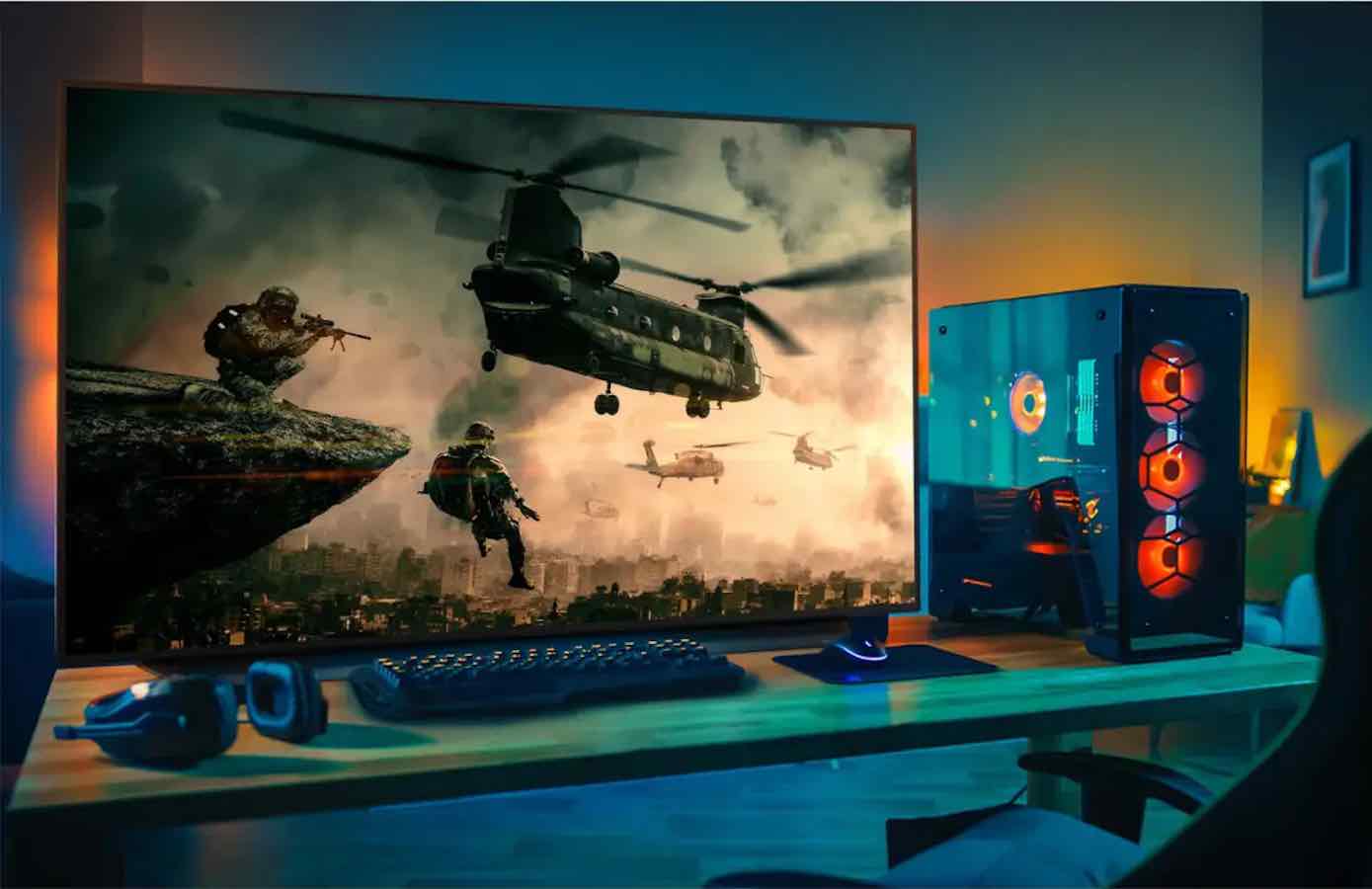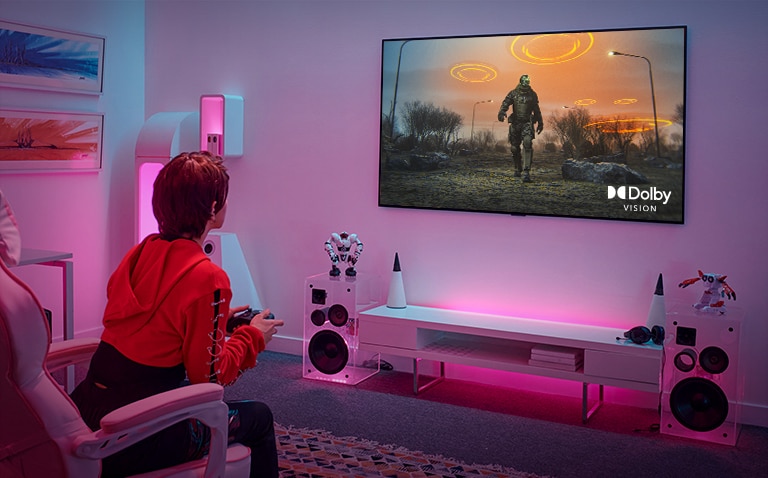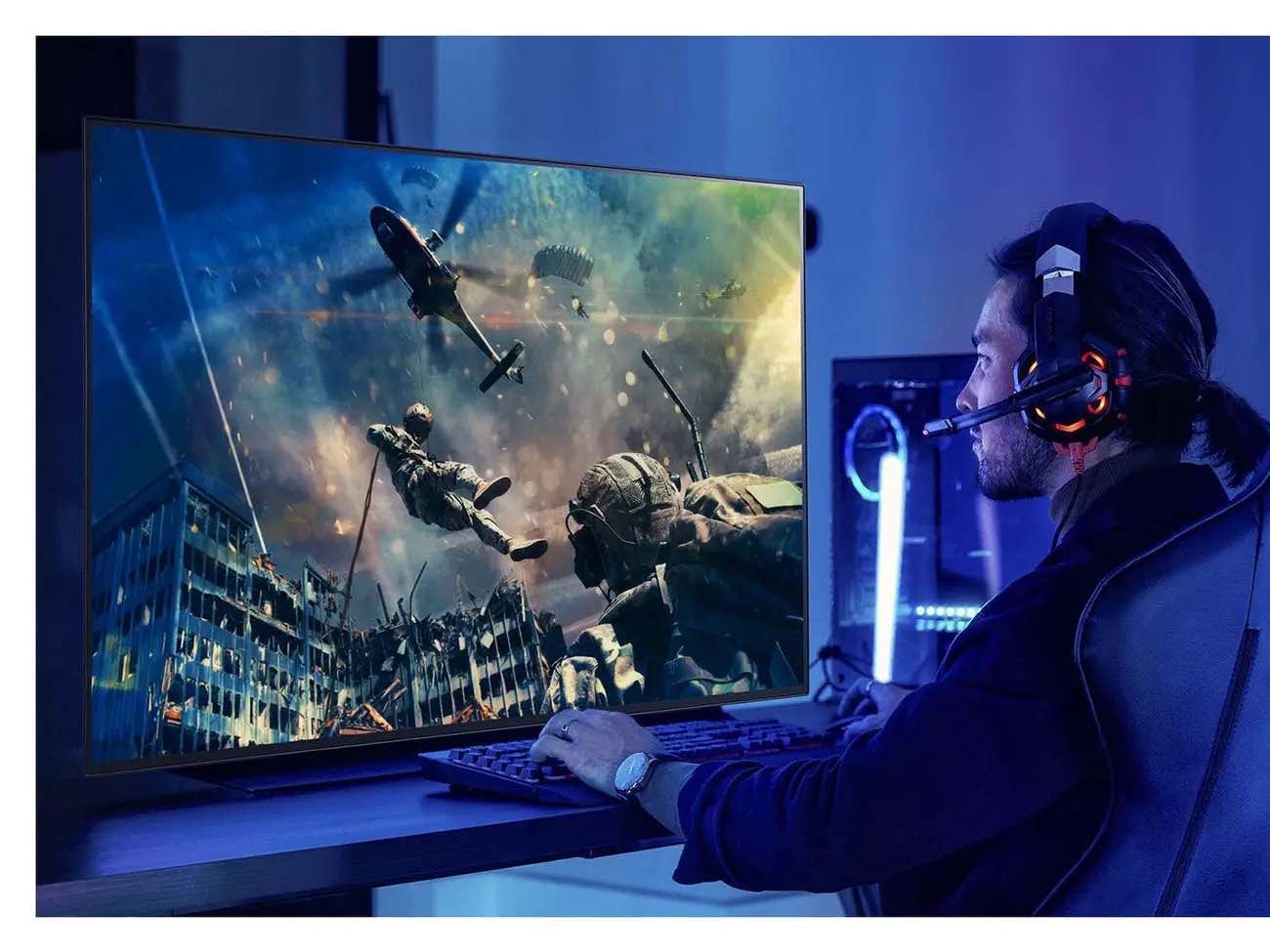 If you’ve always gamed on a PC and you’ve just added a new PS5 or Xbox to your setup, you’ve probably wondered whether you should upgrade your display too. Choosing a gaming TV vs a gaming monitor will be one of your first considerations if you’re gaming on multiple platforms. Your choice will depend on your personal preference, but there are a few differences to take into consideration before you make your decision.
If you’ve always gamed on a PC and you’ve just added a new PS5 or Xbox to your setup, you’ve probably wondered whether you should upgrade your display too. Choosing a gaming TV vs a gaming monitor will be one of your first considerations if you’re gaming on multiple platforms. Your choice will depend on your personal preference, but there are a few differences to take into consideration before you make your decision.
What is a gaming TV?
A gaming TV is a TV with built-in features designed to make the most of your gaming console. Most gaming TVs have similar features.
- 4K UHD or 8K resolution with HDR
- Sizes ranging from 32 inches up to 77 inches or larger
- OLED, Mini-LED, or QLED backlight
- 4K/120Hz or variable refresh rate
- Low input lag with some TVs running as low as 6ms
- One-touch gamer bar or setting with features like NVIDIA graphic support or settings dialled in for your console
- HMDI 2.1 with multiple ports for connecting soundbars and multiple consoles or devices
- Built-in gaming platform with all of your games pre-loaded
What is a gaming monitor?
A gaming monitor is a computer monitor designed for PC gaming, but it can be used for console gaming too. Some gaming monitors are curved for a more immersive experience, while others have flat, non-reflective screens and wide viewing angles. You’ll find all types of gaming monitors, but they tend to share many of these features:
- Available in 1080p, 2K, and 4K resolution
- OLED, QLED, and LED backlight
- Aspect ratio of 16:9, 21:9, and 32:9
- Response time of less than 2ms up to 9.9ms
- G-Sync or Free-sync adaptive sync technology
- All types of monitors including ultrawide, curved, touchscreen, or screen with speakers
- Some monitors are compatible with graphics cards like NVIDIA
Gaming TV vs gaming monitor

How do you decide between a gaming TV and a gaming monitor? There are 3 differences you’ll want to consider before you make your choice.
1. Screen size of gaming monitor vs gaming TV
The size of your display is one of the biggest decisions you’ll make when choosing a gaming TV or gaming monitor. Gaming monitors generally run from 21 inches to 32 inches, with the average being 27 inches. You can even find some very large screen over 45 inches in size. On the other hand, when you choose a gaming TV you can choose a screen size up to 77 inches.
Deciding on screen size mainly comes down to where you’ll be gaming. If you have a console you share with others and it will stay in your living room, a gaming TV is a good choice. Any TV with features designed for gaming will also make a great living room TV, so it’s a win-win in a communal area.
If, on the other hand, you have a dedicated room for gaming and you play on both a PC and a gaming console, a gaming monitor may be the best choice. You can combine multiple gaming monitors to surround yourself with the action or play on a split-screen if you’d like to. With a larger sized monitor, you’ll stay connected to your PC but still be able to kick back on a couch a distance away from your desk and play via console.
2. Resolution of a gaming monitor vs gaming TV
Resolution is the number of pixels your TV or monitor can produce. You can read more about how TVs and monitors use pixels to sharpen an image in the TV buying guide.
When you’re choosing between a gaming monitor vs a gaming TV, resolution is going to be what quickly narrows down your selection. A gaming monitor has some variability in screen resolution, and you can choose gaming monitors that are 1080p Full HD, 2K 1440p Quad HD, and 4K 2160p Ultra HD.
One of the most popular choices for a gaming monitor is still 1080p as most PC games run in Full HD and most graphic cards have a harder time processing 4K. 4K resolution isn’t as obvious on a 27-inch screen either, so many people who are strictly PC gaming will opt for a gaming monitor.
If you’re gaming on multiple platforms, resolution can make a huge difference. While you can game on a 1080p Full HD TV and a Full HD TV is less expensive than 4K models, the latest gaming consoles support 4K UHD with HDR. That means on larger sizes of 1080p TV, your gaming content will look stretched out and may be blurry. When you’ve invested in a PS5 or new Xbox, you definitely don’t want your game to look less sharp than it should.
4K is the industry standard now, and choosing a 4K TV means you’ve got a gaming display that’s bright, has brilliant colour, and can run your favourite games the way they are intended to run.
3. Response time, refresh rate, and input lag for gaming

For gamers, one of the most important considerations when choosing a gaming TV vs a gaming monitor is the display vs console performance time – also known as response time, refresh rate, and input lag.
Response time on a gaming TV vs gaming monitor
Response time, or pixel response, is how fast your display can change the colour of a pixel. A TV or gaming monitor with a fast response time will switch so fast you’ll never see blur or ghosting. You’ll find gaming monitors with response times of 1ms to 5ms and gaming TVs with response times of 5 ms and higher.
Input lag on gaming monitor vs gaming TV
Input lag is how much of a delay there is when transferring data between the console and the TV or monitor. Time is measured in milliseconds, with gaming monitors ranging from 1ms to 4ms input lag and gaming TVs ranging from 5 ms to 16ms or higher. Input lag can depend on what console you’re gaming on too.
Refresh rate on a gaming TV and a gaming monitor
Refresh rate is a measurement of how fast your display can refresh the images on the screen and how many frames per second it can produce. Monitors have refresh rates or framerates of 60 Hz, 75 Hz, 100 Hz, 120 Hz, 144 Hz, and 240 Hz, with 240 Hz being the most responsive and best for gaming.
Gaming TVs are slightly different, and they generally have refresh rates of 120 Hz or 240 Hz. Because gaming TVs are TVs that can be used for watching movies, sports, and other fast-action video, they also have technology built in to enhance the framerate and reduce overall motion blur.
If you’re going to make your decision on a gaming TV vs gaming monitor based on these three factors, your best option may be a gaming monitor. They are designed to have a speedy response time and refresh rate, and they have a lower lag time than a gaming TV. Gaming will feel smoother and more fluid the better your monitor’s refresh rate.
Will display will you choose for gaming?

Choosing a gaming TV vs a gaming monitor comes down to personal choice. If you want to game on the biggest screen possible, a gaming TV will be for you. Gaming TVs are also a good choice for anyone who wants a 4K screen to play on multiple platforms.
On the other hand, if you play a lot of MMO, MMORPG, or MOBA games, milliseconds can make or break you. Glitchy graphics and stalled gameplay can take you out of your game too. In that case, you may want a gaming monitor as they have the lowest lag times, highest refresh rates, and speedy response times.
Whichever display you decide to bring home, you’ll find a variety of gaming monitors and gaming TVs to choose from at Best Buy.



